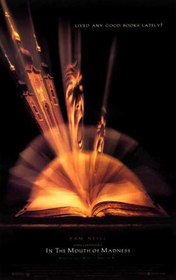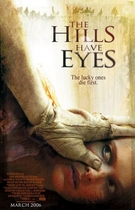Our editor-in-chief Nate Yapp is proud to have contributed to the new book Hidden Horror: A Celebration of 101 Underrated and Overlooked Fright Flicks, edited by Aaron Christensen. Another contributors include Anthony Timpone, B.J. Colangelo, Dave Alexander, Classic-Horror.com's own Robert C. Ring and John W. Bowen. Pick up a copy today from Amazon.com!
In the Mouth of Madness (1995)
Many peaks and valleys punctuate John Carpenter's directorial career. The peaks are capped with classics such as Halloween (1978) and The Thing (1982); underachievers such as Ghost of Mars (2001) and They Live (1988) haunt the valleys. In the Mouth of Madness is a film that struggles for a place in either category. While by no means a failure, the film is far from a success.
Riding his success in films such as The Piano and Jurassic Park, Sam Neill plays John Trent, an insurance investigator who is committed to an insane asylum and haunted in his cell by a shadowy demon. After a doctor approaches to release Trent, the story unfolds as an extensive flashback seeking to explain his psychotic condition. Trent was assigned to a publishing company whose star writer, Sutter Cane (aptly played by Jurgen Prochnow) is apparently missing. His disappearance follows his latest book release, an event that triggers hysteria among his readers because when stores run out of copies, Cane's fans go crazy.
As Trent investigates, he cleverly cuts out different elements of Cane's book covers and assembles them in the shape of New Hampshire. A red dot in the shape marks the location of historic Hobb's End, an idyllic New England town where Cane is apparently camped. Trent and Cane's editor, Linda Styles, track down the eccentric writer, and their journey quickly degenerates into a nightmarish world of fantasy, hallucination, and raw horror.
The cast here is impressive on the surface, especially with Charlton Heston playing Cane's publisher, Jackson Harglow. However, Heston sleepwalks through this minor role, and Neill sporadically shines. His performance is inconsistent at best, especially when one considers the trauma he is experiencing. At times, Trent appears far too sedated for such an ordeal. But Prochnow rocks as the maverick author, and his performance alone helps viewers overlook these inconsistencies.
The plot begins with innovation but quickly devolves into a food fight of horror clichés. And in this buffet, there is plenty to choose. Carpenter is clearly playing on a popular H.P. Lovecraft theme: in isolated towns, monstrous fears await, and the more bucolic the location, the more amplified the horror. In Hobb's End, an alien-like creature in a basement lurks, but its connection to the overall plot of the film seems awkward at best. In the spirit of Stephen King, the typical conflict between fiction and reality that King adroitly penned in novels such as "Misery" and "The Shining" emerges. But here, this fiction-turned-reality theme seems a general admission pass for an incoherent plot. Once Trent and Styles arrive in Hobb's End, logic disappears, as does any critical hope for the film. We also have other standard horror dishes such as raving mobs, psychos brandishing axes, ghoulish old men, surreal drives on dark roads, and Cane himself in classic mad scientist form holing up in a castle-like, or should I say Oz-like, church.
What is particularly disappointing about this film is that no reason is provided for what triggers Trent's insanity, except that he has read Cane's literature. He goes mad because of the insanity at Hobb's End, but his hallucinations begin well before that. Why? Is Cane's literature that powerful? Perhaps if we could learn more about it, we too would be persuaded. Besides the fact that none of the characters are provided much complexity, this departure is quite baffling since the plot hinges on it. We experience occasional excerpts from Cane's work, but overall, we know little about his narratives, other than the fact that when people read them, or are deprived of them (huh?), they go insane. I guess the idea here is everyone is nuts? With or without Cane, his fans are crazy. Ironically, we do see the books' covers, which cannot help but function as a metaphor for the film's superficiality (sorry).
I was also disappointed with Carpenter's music. Instead of his layered and stark synthetic sounds and poignant compositions, In the Mouth of Madness' most memorable grooves echo from a garage-like jam by a mediocre metal band. In films such as Assault on Precinct 13, Halloween, and The Thing, Carpenter's music is a vital element that adds suspense, underlines themes, and even at times helps narrate the story. Here, the most memorable notes are the ones not played.
But In the Mouth of Madness does have merit. The make-up is worth a close study, particularly for its range and detail. The film conjures an impressive array of monsters including a fleshy beast with tentacles, demented psychopaths, midnight ghouls, and some zombie-like fiends. The make-up marks another important installment in Carpenter's oeuvre. And the film will shake your spine. If you want raw terror and horrific imagery, this film will not disappoint. There were at least five scenes that forced me to change my underwear. OK, I exaggerate; I had to do so once.
A red flag for any film viewer should be the words "nightmare," "hallucination," "dream," or "insane." Any time the protagonist is experiencing one of these conditions for a considerable duration, that flag must be hoisted, because if they are not handled carefully, a narrative can fall apart quickly. Sure, such conditions can hold water in a screenplay, but only if the story can. This story can't. Carpenter can do, and has done, much better.
In fact, the best quality of this film is ironically its missed opportunities. There is too much Carpenter abandoned. Prior to the arrival at Hobb's End, there were potent themes that should have been explored, which makes the film appear like two separate stories. For example, the hysteria surrounding Cane's work paved a path for an intriguing commentary on pop culture phenomenon. Harglow and Styles's choice to manipulate Cane's audience by forging his initial disappearance also allows for a critical stance on the mass media's often deceptive marketing techniques. Heston's character is underdeveloped, and we see too little of Hobb's End's normal façade to completely subscribe to its nightmares.
If you are a diehard Carpenter film, don't hesitate to throw those tomatoes. However, if you are not a diehard fan, In the Mouth of Madness is not the film to view if you hope to become one.
Trivia:
The small town is named Hobb's End - a reference to Nigel Kneale's Quatermass and the Pit.









I have to disagree. I think
I have to disagree. I think stacking this film up against Carp's other films is a mistake. No the music doesn't do the same stuff as his other scores, but Carpenter's biggest strength has always been his ability to reinvent himself without losing his style or inner voice. This is a very different horror film for him and I love it to death. It manages to combine big ideas, scary sequences and a good sense of fun into a compact, unified film. It's not to all tastes, but it should be!